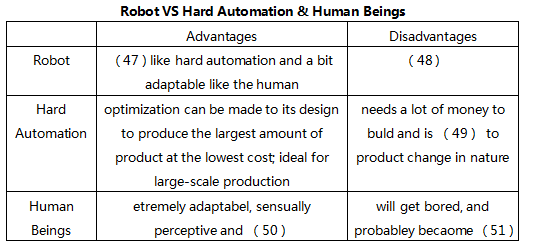?英語科技文選自考2008年04月真題
摘要:該試卷為自考英語科技文選歷年真題試卷,包含答案及詳細解析。
英語科技文選自考2008年04月真題及答案解析
該試卷為自考英語科技文選歷年真題試卷,包含答案及詳細解析。
一、詞綴題
Directions: Add the affix to each word according to the given Chinese, making changes when necessary. (10%)
1.astronomy 天體的
2.permanent 不變的
3.recur 重新產生(名詞)
4.analyze 分析的
5.sphere 半球
6.nutrition 營養不良
7.runner 預兆
8.lie 位于……之下
9.compressed 超高度壓縮的
10.connect 使互相連接
二、填空題
Directions: Fill in the blanks, each using one of the given words or phrases below in its proper form. (10%)
11.a host of on the edge of comply with short of end upbe bound up with stand for in memory of give off at workIt was reported in this morning’s newspaper that the company is _____________ collapse.
12.X in that math equation _____________ an unknown amount.
13.I am a little _____________ time over the next few days, but perhaps we could schedule an appointment next week.
14.The fire _____________ thick swirling smoke.
15.After two weeks of traveling around Europe, we _____________in Paris.
16.The survival of these creatures _____________ the health of the ocean.
17.There is _____________ of reasons why he didn’t get the job.
18.Many university buildings are dedicated _____________ important people.
19.Laborers were _____________ in the fields reaping.
110.If you join the club, you must _____________ its rules.
三、選詞填空題
Directions: Fill in each blank with a suitable word given below. (10%)
21. same bread wing other to very over it with for A woman was sitting on the beach in front of her California home and eating a sandwich when she noticed a seagull. The bird was (21) near her. It seemed to have a broken (22). The woman took a bit of bread and threw it (23) the bird. The seagull ate the bread. Then it turned and walked slowly (24) a hill of sand and disappeared. The next day the (25) bird appeared again. The woman was sad to see the seagull (26)its broken wing. Clearly, the bird couldn’t fly. Again, she gave it some (27). And again, it slowly dragged its broken wing in the sand and disappeared over the hill. This happened every day(28)two weeks .The woman wondered, “What happens to that poor bird each day? Where does it go?” She decided to find the answer. After the bird ate the bread, the woman quietly followed(29)over the hill. The bird reached the (30) side. Then it picked up its “broken” wing and flew high and straight into the summer sky.
四、用法說明題
Directions: Translate the following sentences into English, each using one of the given words or phrases below. (10%)
31.beyond one’s comprehension elucidate take…for granted perceive accessible1、在經濟危機之后,人們不再認為他們房子的價值會繼續升高。2、他是公司的首席執行官,但總是平易近人。3、我希望我的書將闡明我們面臨的復雜問題。4、你為什么把失敗視為當然呢?5、我不明白她如何能在一天之內做那么多事情。
五、翻譯題
Directions: Translate the following paragraph into Chinese. (15%)
41.Cyberspace,of course. is bigger than a telephone call. It encompasses the millions of personal computers connected by modems-via the telephone system-to commercial online services, as well as the millions more with high-speed links to local area networks, office E-mail systems and the Internet. It includes the rapidly expanding wireless services: microwave towers that carry great quantities of cellular phones and data traffic; communications satellites strung like beads in the geosynchronous orbit; low-flying satellites that will soon crisscross the globe like angry bees, connecting folks too far –flung or too much on the go to be tethered by wires. Someday even our television sets may be part of cyberspace, transformed into interactive “teleputers” by so-called full-service networks like the ones several cable-TV companies (including Time Warner) are building along the old cable lines, using fiber optics and high-speed switches.
六、閱讀理解題
Directions: Read through the following passages. Choose the best answer and put the letter in the bracket. (20%)
51. (A) An EI Nino year begins when the trade winds lessen. Without these winds to blow warm surface water to the western Pacific, sea currents pull the warm water east, along with the storms and rain. The result is drought in countries of the western Pacific and heavy rainfall in the central Pacific and along the coast of South America. The appearance of all this warm water in the east has deleterious effects on the west coast of the Americas. Deprived of cold nutrient-rich water, fish stocks plummet, as marine life either starves of migrates to other waters. Agriculture also suffers. Dry weather crops found along South America’s usually arid coastal regions seldom survive heavy rainfall or flooding. But the climatic disruption caused by EI Nino stretches far beyond the shores of the Pacific Ocean. Ocean currents that pull the warm water toward South America create winds that blow across Central America and the Caribbean, into the Atlantic. Plenty is known about EI Nino destructive potential, but the phenomenon itself remains frustratingly mysterious. Despite years of research, climatologists are still unable to predict how destructive an EI Nino will be when it arrives. However, progress is being made on forecasting when one will occur. This is vital because if enough warning is given, steps can be taken to limit the destruction and suffering that follow a bad EI Nino. At the very least, farmers would know whether to plant dry or wet weather crops. Of more concern is the possible relationship between EI Ninos and global warming. Climatologists believe that EI Ninos will become more frequent and more severe in a warmer world. There is no conclusive evidence to support this, but it may be significant that the two most destructive EI Ninos on record occurred in the last two decades of the twentieth century, which were the warmest on record. If it turns that EI Nino is affected by global warming, this news portends badly for the future. It would mean that even a very small increase in the average global temperature could totally alter the world’s weather patterns. This would upset many ecosystems and could result in widespread starvation, epidemics, and the extinction of certain key species. EI Nino is widely seen as a curse. But, if it makes us more aware of global warming,we may one day remember it as a blessing. What does the passage mainly discuss?
A.Damages from EI Nino to the Americas.
B.The need for early EI Nino forecasting.
C.Damages from and issues about EI Nino.
D.The relationship between EI Nino and global warming.
52.How does the warm water in the eastern Pacific affect the west coast of the Americas?
A.Fish are out of stock.
B.Sea water is cold and rich in nutrients.
C.There is more rain than usual along the coast of South America.
D.The coast of South America is no longer fit for crop growing.
53.According to the passage, which of the following is true of EI Nino prediction research?
A.It will help people know more about ecosystems and further develop their
consciousness of environmental protection.
B.It may help wipe out EI Nino from the earth in the future.
C.With early prediction, people could take steps to decrease the destruction and
suffering brought by EI Nino.
D.It may be useless because it is impossible for human beings to change a natural
phenomenon.
54.Which of the following is the author most likely to agree?
A.There is a close relationship between EI Nino and global warming.
B.EI Nino will become more severe if the global warming is more serious.
C.It can’t be said for certain right now that EI Nino is closely related to global
warming.
D.A slight increase in global temperature could completely change the world’s
weather patterns.
55.By saying “we may one day remember it as a blessing,” the author suggests that having learned about EI Nino, sometime in the future, we will________.
A.know how to prevent it from happening
B.take global warming more seriously
C.take advantage of it
D.care for key species more and save them from dying out
56. (B) In the geocentric perspective from which humans viewed the solar system, its nature and structure were long misperceived. The apparent motions of solar system objects as viewed from a moving Earth were believed to be their actual motions about a stationary Earth. In addition, many solar system objects and phenomena are not directly sensible by humans without technical aids. Thus, both conceptual and technological advances were required in order for the solar system to be correctly understood. The first and most fundamental of these advances was the Copernican Revolution, which adopted a heliocentric model for the motions of the planets. Indeed, the term “solar system” itself derives from this perspective. But the most important consequences of this new perception came not from the central position of the Sun, but from the orbital position of the Earth, which suggested that the Earth was itself a planet. This was the first indication of the true nature of the planets. Also, the lack of perceptible stellar parallax despite the earth’s orbital motion indicated the extreme remoteness of the fixed stars, which prompted the speculation that they could be objects similar to the Sun, perhaps with planets of their own. Since the start of the space age, a great deal of exploration has been performed by unmanned space missions that have been organized and executed by various space agencies. The first probe to land on another planet or moon was the Soviet Union’s Luna 2 probe, which impacted on the moon in 1959. Since then, increasingly distant planets have been reached, with probes landing on Venus in 1965, Mars in 1976, and Saturn’s moon Titan in 2005. Spacecrafts have also made close approaches to other planets: Mariner 10 passed Mercury in 1973, while the Voyager probes performed a grand tour of the solar system following their launch in 1977, with both probes passing Jupiter in 1979 and Saturn in 1980-1981. Voyager 2 then went on to make close approaches to Uranus in 1986 and Neptune in 1989. The Voyager probes are now far beyond Pluto’s orbit, and astronomers anticipate that they will encounter the heliopause which defines the outer edge of the solar system in the next few years. Through these unmanned missions, we have been able to get close-up photographs of most of the planets and, in the case of landers, perform tests of their soil and atmosphere. Manned exploration, meanwhile, has only taken human beings as far as the Moon, in the Apollo program. The last manned landing on the moon took place in 1972, but the recent discovery of ice in deep craters in the polar regions of the moon has prompted speculation that mankind may return to the moon in the next decade or so. The long-mooted manned mission to Mars does not currently look like coming to fruition in the near future. What is the main idea of the passage?
A.Many solar system objects cannot be seen without technical aids.
B.Solar system objects move about a stationery Earth.
C.Solar system objects move about a moving Earth.
D.People could understand the nature of the solar system better with
technological progress.
57.Which of the following is true according to the Copernican Revolution?
A.The planets move around the Sun.
B.The Earth is a planet.
C.People began to know the true nature of the planets.
D.The remotest fixed stars have planets of their own.
58.In the 20th century, spacecrafts reached the planets EXCEPT_________.
A.the moon
B.Mars
C.Saturn
D.Venus
59.What is implied about the Voyager probes?
A.They would probably reach the outer edge of the solar system.
B.They traveled faster than Pluto.
C.They were beyond both Uranus’ and Neptune’s orbits by the end of the 1980s.
D.They traveled around Saturn several times.
510.According to the passage, since the start of the space age, spacecrafts have reached the planets for _______ times.
A.12
B.5
C.4
D.11
七、信息題
Directions: Read the following passage, and then fill in the table with the information based on the passage. (10%×2%)
61. Hard automation can be defined as the use of delicate pieces of machinery, typically to produce the same item over long periods of time. This is expensive to build and inherently inflexible to product changes. However, its design can be optimized to produce the maximum amount of product at a minimum cost, so it is more attractive than the use of robots for the large-scale production of a few different items. However, much of industry is concerned with batch production where perhaps one type of item is made during the morning and another during the afternoon. Human beings are very good in this environment. From a robotic point of view they are light, mobile structures with exceptionally good sensory perception and intelligence far above that of any current robot. This gives them superb adaptability. However, they tire, may become unreliable, unpredictable, and may well wish to be pursuing other activities which give greater scope for the use of their intelligence, or indeed just give greater pleasure.
A robot will neither be optimized for a particular application nor have the adaptability of the human. However, it can combine the reliability and predictability (at least until robots are made “intelligent”) of hard automation systems with a little of the adaptability of the human. Robots therefore have a place somewhere between these two extremes. For robots to play a positive part in supporting human activity, not only must they adequately perform a given task but the human aspects of any implementation must be thoroughly considered.
八、寫作題
Directions: Write a passage (150-200 words) in English on the following title. Develop the idea according to the Chinese outline given below. (15%)
71.Fighting Pseudoscience
延伸閱讀
- 2025年4月自考政治經濟學(中級)全真模擬試題
- 2023年10月自考00257票據法真題
- 2023年10月自考00249國際私法真題
- 2023年10月自考00246國際經濟法概論真題
- 2023年10月自考00245刑法學真題
- 2023年10月自考00186國際商務談判真題

自考微信公眾號

掃碼添加
自考備考資料免費領取
去領取











 掃描二維碼
掃描二維碼